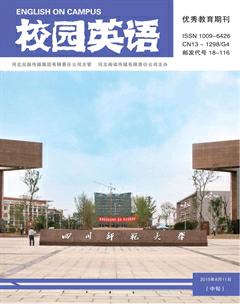Establishing the mobile learning system in English Teaching
刘巍
【Abstract】as the IT industry develops,smartphones are dorminant.The application of smartphones in English teaching is effective and both teachers and students can benefit.
【Key word】mobile learning; English teaching
I.Introduction
As the reform of English teaching in China becomes more intense,educators contrive to develop a more reasonable learning ecosystem.With the IT industry and e-products more available,a new revolution of teaching has arrived.Both teachers and students face great challenges.
The first challenge is related to the shift from a traditional teacher-centered,summative assessment driven educational culture,to the more learner-centered,collaborative,facilitative,self-regulated model and ultimately real-world nature of the practices that may derive from using the structure of CBL.The second challenge is technological; specifically,integrating mobile learning technology into the language classroom.The third challenge is related to the achievement of English Language content delivery balance.To meet these challenges,courses should be designed cautiously in advance.
II.advantages of applying smartphones in learning English
As mobile technology,information technology,and portable devices have been advancing,educators apply those tools to learning and teaching to create a learning and teaching environment which is not restricted by time and locations.Facer claimed that most teachers and students,in the U.K.,had then taken mobile technologies a familiar part in their daily lives.[1]Since then,information technology has got involved in education.As long as information technology can benefit language learning,learner's achievement can depend on the accessibility and convenience of a learner's using a mobile device for learning.[2]
A smartphone as a mobile phone that is able to perform many of the functions of a computer,typically having a relatively large screen and an operating system capable of running general-purpose applications.With the trend of mobile learning,many learning materials have been developed,in the form of Podcast,widget,and APPs,while others embed the features of interactions and communication to enhance the effectiveness of language learning by using mobile devices.[3]
III.Research on the application of mobile learning
In this study,two classes of freshmen join in this case study.For the study effectiveness,we conducted a pre-test and a post-test on the students.The implementation of this study included traditional in-class teaching and mobile learning after class.Afterwards,a questionnaire survey was administered.The instrument is a learning system provided by university,which can be downloaded to the smartphone.
All the quantitative data collected from the questionnaire was analyzed by SPSS 19.0 descriptive statistics,t-test,and One-way ANOVA.SPSS 19.0 was utilized for statistical analysis in this study.T-test helped to observe the progress of students performance by the tests.between the experiment and control group and detect improvements in these two groups.The improvements within each group were also calculated.Finally,the responses in the questionnaires were examined and computed by SPSS descriptive analysis.The followings are some of the analysis results.
1.The average score of the tested students improve 5 points.
2.students attitude toward the use of the learning system on the smartphone shows that the students are with high acceptance in using a smartphone as a learning tool.They expressed a positive attitude to mobile learning in the condition of improving their performance in English.
3.The students take a positive attitude toward the learning materials and the way which was conducted for more practice after class.The exercises help them review and get proficient at what was taught in class.
4.There are also some problems.Students,if they cannot finish the assignment in time,cannot continue learning.
Reference:
[1]Facer,K.(2004)Foreword to the Literature in Mobile Technologies and Learning.In: Naismith,L.,Lonsdale,P.,Vavoula,G.,& Sharples,M.(eds.)Futurelab report 11.
[2]Chinnery,G.M.(2006)Emerging Technologies Going to the MALL: Mobile Assisted Language Learning; Language Learning & Technology 10(1),9-16.
[3]Kukulska-Hulme,A.M.,& Shield,L.(2008)An overview of mobile assisted language learning:From content delivery to supported collaboration and interaction.ReCALL 20(3),271-289.
- 校园英语·中旬的其它文章
- On Dynamic Characteristics of Culture and its Implications
- A Contrastive Study of Verbal Taboos in Chinese and EnglishHu Bei University OF Arts AND Science
- An Analysis of Chinese College Students’ Reasons for and Attitudes towards Chinese—English Code—Switching (CS)in Their Daily Speech
- Rootlessness on a Transitional Cultural Space
- 概念隐喻理论视角的英汉基本颜色词“黑”隐喻用法差异
- 生态翻译学视角下富含文化意象的方剂名英译的策略分析

